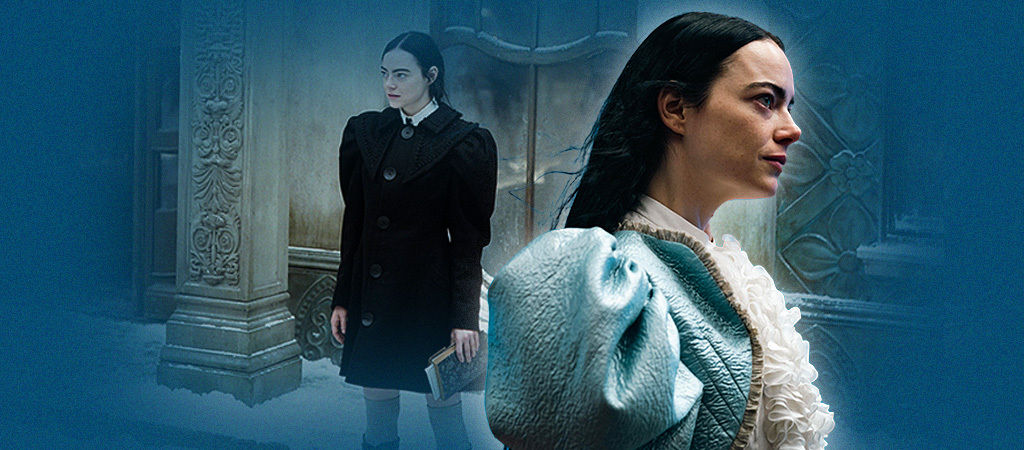There’s a good chance I’ve written this quick, at best marginally interesting story before, but I decided I don’t care so here it is again. The first Yorgos Lanthimos movie I ever saw was his first English language movie, The Lobster. I remember seeing it in 2015 (I seriously can’t believe it’s been that long, but also I can) at the Toronto International Film Festival because I like Colin Farrell movies and absolutely fell in love with it. Though, as you know if you’ve seen it, it’s a strange film, as most if not all Lanthimos’s movies fall into this category. As I walked out, a colleague and I started joking how that was a “meat and potatoes” kind of movie (again, it’s not). How it’s, “the kind of movie you watch with the family around the holidays,” (also a joke). You know, “It’s the kind of movie John Wayne used to make,” (maybe if he’d been tricked, and I’m fairly convinced he got tricked into doing The Searchers, so I’ll leave this one open).
I thought of these jokes after I saw The Killing of a Sacred Dear and The Favourite – a movie I like but strangely my least favorite of those three, even though it’s by far the most successful of the three and the most accessible. Anyway, I thought of all that again when I saw Poor Things, a movie I’m fairly sure I love, but I don’t like saying that so soon after I see something because I do think longevity matters with these sorts of things. There are a lot of movies I’ve loved over the years that I truly have never thought about again, which kind of proves I didn’t love them as much as I perhaps thought I did. Though Lanthimos’s movies do have a way of sticking with me long after I’ve seen them, so I feel slightly more comfortable making that claim here.
What’s interesting about Poor Things, as opposed to, say, The Lobster, is how Lanthimos weaves his absurd and macabre story into something that feels more like this entire world we are watching is absurd.
We first meet Bella (Emma Stone), fully grown, but acting like an infant. She’s the creation of Dr. Godwin Baxter (Willem Dafoe), who found her body floating in a river after an apparent suicide. At the time Bella’s former self drowned, she was pregnant. Dr. Baxter, who, himself, had been experimented on endlessly as a child by his father, transplants the unborn baby’s brain into Bella, creating a grown adult with the mind of a child. Max McCandles (Ramy Youssef) is hired by Dr. Baxter to document Bella’s progress, which is fast. Max then falls in love with Bella and Dr. Baxter suggests the two marry, with the stipulation Bella never leaves the premises. The lawyer reviewing this agreement, a cad named Duncan Wedderburn (Mark Ruffalo, having the time of his life) convinces Bella to run off with him instead promising that he’s the greatest lover who’s ever lived. And off we go.
Most of the movie follows Bella’s physical journey from location to location, but also (as you’ve probably heard by now) her sexual journey. An interesting thing about Bella is her transformation from the behavior of an infant to, by the end, a very intelligent woman, is so gradual there’s never an “oh, there it is” moment. Every phase of Bella’s mental growth still has some traits of the previous one and some traits of the one to come, blending them all together where we, as an audience, really feel like we watched this person become fully developed over the course of 140 minutes.
Emma Stone gives the performance of a lifetime in this. The best word I can give here is “fearless.” She does a lot of things in this movie that a lot of actors would never do. Acting is hard! Especially in a role like this, while everyone in the cast crew is doing their job but also there observing. If there’s an ounce of doubt in Stone’s mind about the performance she’s giving, just a little bit of that self-conscious fear, there’s no possible way this works. Like, seriously … none. But she just goes for it and it’s a masterful thing to watch.
Though, at the aforementioned 140 minutes, there’s only so long a person, namely us, can stay in this world without it wearing out its welcome, and by the time Poor Things ended I was almost there, but not quite. Though I can certainly see someone not as high on Lanthimos’s aesthetics and quirks having a lower threshold. It’s a lot. But, personally, I’m glad it’s a lot. Poor Things does feel like a culmination, of sorts, of all the things that make Lanthimos’s movies unique and special. I, for one, am very pleased he’s still making what would be the opposite of these “meat and potatoes” movies.
You can contact Mike Ryan directly on Twitter.







